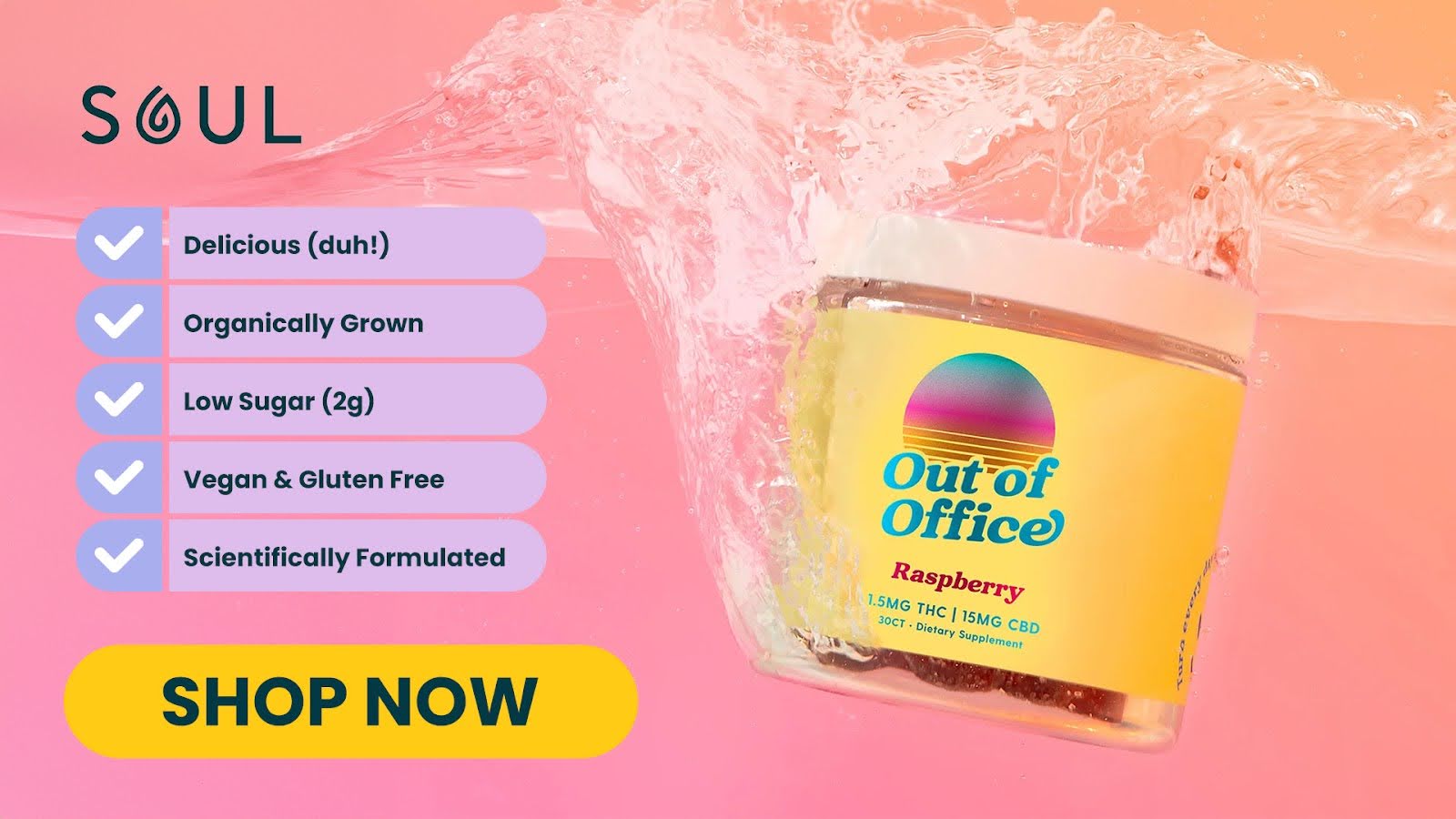
Key Takeaways:
- Strict Prohibition for Recreational Use: Tennessee maintains a strict prohibition against the recreational use of hemp, only allowing low-THC products for certain medical conditions.
- Legal Penalties and Enforcement: The state imposes significant penalties for possession, use, or sale of high-THC cannabis, with enhanced penalties near drug-free zones.
- Evolving Legal Landscape: Public opinion and legislative changes in neighboring states may influence future modifications to THC laws in Tennessee, signaling potential shifts towards more lenient policies.
Welcome to Soul, where innovation meets tradition in the world of cannabis. As a leading authority in THC and CBD products, we pride ourselves on delivering high-quality, responsibly sourced options that cater to both seasoned connoisseurs and newcomers alike. At Soul, we don’t just sell products; we elevate experiences. In this article, we'll look at the rules about THC in Tennessee. We'll discuss whether THC is legal, its use for medical reasons, the consequences of having it, and how federal laws affect state rules. Whether you’re a Tennessee resident or planning a visit, here’s what you need to know about navigating the complexities of THC in The Volunteer State.
Understanding The Difference Between Medical And Recreational Use
In Tennessee, the distinction between medical and recreational use of THC is crucial in understanding the legal framework surrounding cannabis. Medical use typically refers to the use of hemp-derived products, including THC, for managing or treating specific health conditions under a doctor's supervision. Recreational use, on the other hand, involves using hemp for personal enjoyment rather than for health benefits.
As of now, Tennessee has a very restrictive medical hemp program. The state allows the use of low-THC cannabis oils for a narrow list of qualifying conditions, such as intractable seizures. This oil must contain no more than 0.9% THC, which is considerably lower than typical medical hemp products in other states. Recreational use of THC remains illegal, and there are no laws permitting the possession, sale, or consumption of cannabis for recreational purposes.
Current Laws Governing THC In Tennessee
Navigating the legal landscape of THC in Tennessee can be complex, with specific regulations that govern its use, distribution, and legal status. Here's a concise overview of the current laws:
THC Prohibition
Tennessee strictly enforces the prohibition of hemp with high THC content for recreational use, designating it under state law as a Schedule VI controlled substance. This classification reflects the state's stringent stance against recreational cannabis, aligning with federal regulations that continue to categorize THC as an illegal drug. Violations involving high-THC hemp can lead to severe legal consequences, emphasizing the state's commitment to limiting access to psychoactive cannabis.
Low-THC Medical Cannabis
In Tennessee, medical use of cannabis is tightly restricted to low-THC products, specifically cannabis oil containing no more than 0.9% THC. These products are legally prescribed for severe medical conditions, primarily intractable seizures. The legislation requires a prescription from a licensed physician and is intended to provide relief for patients under strict medical supervision without opening the door to broader medical hemp use.
Hemp And CBD
Adhering to the 2018 Federal Farm Bill, Tennessee permits the cultivation and sale of hemp products that contain less than 0.3% THC. This has led to the widespread availability of CBD products across the state, ranging from edibles and tinctures to topical creams. These products must comply with state and federal regulations, focusing on non-psychoactive benefits and marketed primarily for health and wellness purposes.
No Comprehensive Medical Hemp Program
Unlike states with expansive medical hemp laws, Tennessee lacks a comprehensive program that would allow the use of various THC-containing products for a wide array of medical issues. This limitation means that many patients with conditions potentially alleviated by higher THC levels have to either forgo such treatments or find legal alternatives within the state's strict legal framework.
Penalties For THC Possession In Tennessee
Understanding the penalties for THC possession in Tennessee is crucial for residents and visitors alike. The state enforces a range of consequences based on the amount possessed and the intent behind it. Below are the details on the legal repercussions for various levels of THC possession:
Simple Possession
In Tennessee, possession of a half ounce (14.175 grams) or less of hemp is classified as a misdemeanor. This offense can lead to penalties including up to one year in jail and a fine of up to $250 for the first offense. Subsequent offenses can increase the fine to up to $500. These strict penalties aim to deter the personal use and possession of hemp, reflecting the state's conservative stance on drug enforcement.
Possession With Intent To Distribute
Possessing more than a half ounce of hemp in Tennessee often triggers the assumption of intent to distribute, escalating the charges to a felony level. This significant legal escalation includes harsher consequences such as extended jail terms and larger fines, which can profoundly impact an individual’s life. This classification aims to combat the distribution and sale of hemp and reflects the state's rigorous approach to controlling drug circulation.
Paraphernalia Charges
Tennessee law also targets the possession of paraphernalia associated with hemp use, such as pipes, rolling papers, and other drug-related items. Being found with these items can lead to criminal charges, potentially resulting in fines and jail time. These laws serve as a complement to possession laws, widening the scope of enforceable offenses related to drug use to include the tools used for consuming drugs.
Drug-Free School Zones
The penalties for possessing THC or THC-containing products escalate significantly if the offense occurs within a drug-free school zone. In these areas, fines and potential jail times can be doubled, reflecting the state’s prioritized concern about protecting young people from drug exposure. This heightened penalty structure demonstrates Tennessee’s commitment to creating and maintaining safe environments for students.
Impact Of Federal Laws On Tennessee's THC Regulations
Tennessee's THC regulations are significantly shaped by federal laws, creating a framework that both restricts and permits certain uses of cannabis and its derivatives. Here is how these federal statutes impact state policies and practices regarding THC:
Controlled Substances Act
The Controlled Substances Act at the federal level classifies hemp as a Schedule I drug, a category reserved for substances with a high potential for abuse and no accepted medical use. This classification heavily influences Tennessee's strict stance against THC, ensuring that state laws remain closely aligned with federal prohibition. This alignment not only affects the legality but also shapes public perception and law enforcement practices regarding hemp use and possession in Tennessee.
Farm Bill And Hemp
The passage of the 2018 Farm Bill was a pivotal moment for the cannabis industry, as it federally legalized the cultivation of hemp and defined it as a cannabis plant containing less than 0.3% THC. This legislation allows Tennessee to regulate the production and sale of hemp-derived CBD products while maintaining a strict boundary against cannabis products with higher THC concentrations. This clear legal distinction helps to foster a growing market for CBD products, which are touted for their therapeutic benefits without psychoactive effects.
Federal Enforcement Priorities
Although federal authorities have shifted their focus away from prosecuting individual hemp offenses in states where it is legal, Tennessee's adherence to federal law means that state law enforcement continues to actively prosecute THC-related offenses. This approach underscores the state’s commitment to enforcing its drug laws, despite changing attitudes and legal statuses concerning hemp in various other states.
Impact On Medical Research And Banking
Federal restrictions under the Controlled Substances Act limit the scope of research into the medical benefits of cannabis, impacting the development and approval of THC-based treatments within Tennessee. Additionally, these federal laws create significant hurdles for businesses dealing in legal cannabis products, as they often struggle to access essential banking services. This situation stifles the growth of the cannabis industry in Tennessee, limiting its economic and therapeutic potential.
Legal Alternatives To THC In Tennessee
In Tennessee, individuals seeking alternatives to THC due to legal constraints or personal preferences have several options available. Explore these legal substitutes and their specific regulations in the state:
CBD Products
CBD (cannabidiol) derived from hemp is one of Tennessee's most accessible and legal alternatives to THC. These products, which must contain less than 0.3% THC to comply with both state and federal laws, are available in a variety of forms, including oils, edibles, capsules, and topical applications. CBD is widely appreciated for its potential therapeutic benefits, such as reducing anxiety and managing pain, without the psychoactive effects associated with higher THC products.
Delta-8 THC
Delta-8 THC is a minor cannabinoid that occurs naturally in cannabis but at much lower concentrations than Delta-9 THC, the main psychoactive component in hemp. While its legal status can be somewhat ambiguous, it is generally regarded as legal in Tennessee when derived from legally grown hemp, as per the 2018 Farm Bill guidelines. Delta-8 THC is known for providing some of the euphoric effects similar to hemp but is typically less potent and psychoactive, making it a popular choice available in many local health stores and dispensaries.
Kratom
Kratom is another legal alternative used for pain relief and mood enhancement in Tennessee. Originating from the leaves of a tree native to Southeast Asia, Kratom can act as a stimulant or a sedative, depending on the dosage. It is legally sold in various forms, including powders, capsules, and teas. However, its safety and efficacy are topics of ongoing debate and scrutiny; thus, users are advised to approach Kratom with caution and be aware of potential side effects and dependency issues.
Over-The-Counter And Prescription Medications
For conditions that might otherwise be treated with medical hemp, several over-the-counter and prescription medications are available in Tennessee. These medications can address a wide range of symptoms, including chronic pain, nausea, and spasms, and must be used under the guidance of a healthcare provider. While these alternatives do not involve THC, they can offer significant relief and are a legal option for those who require treatment for similar ailments addressed by medical cannabis.
Future Outlook On THC Legislation In Tennessee
As national attitudes and laws around hemp continue to evolve, Tennessee's stance on THC legislation is also under scrutiny. Here's a look at the factors that might influence future legislative changes in the state:
- Legislative Trends: Observing trends from neighboring states and shifts in public opinion, there's a growing momentum nationally towards more relaxed laws around hemp, which could influence future legislation in Tennessee.
- Advocacy and Public Support: Increased advocacy from local and national organizations, along with rising public support for medical and recreational hemp legalization, may pressurize lawmakers to reconsider current restrictions.
- Economic Incentives: The potential economic benefits from taxing and regulating hemp like alcohol and tobacco might appeal to state legislators, especially given the financial gains seen in states that have legalized hemp.
- Medical Research Expansion: As federal and state perspectives evolve, more comprehensive medical research could provide the needed evidence to support changes in THC legislation, particularly concerning its medical uses.
- Political Changes: Changes in state leadership and shifts in the political landscape could pave the way for legislative reforms concerning cannabis laws in Tennessee.
Final Thoughts
As Tennesseans navigate the complex landscape of THC legislation, it's essential to remain informed about both current laws and potential future changes. The strict prohibitions against recreational THC usage and the tightly regulated medical use underscore the state's conservative stance on cannabis. However, the evolving national dialogue on hemp legalization and the economic and medical implications could influence future legislative adjustments.
Residents should stay updated on legislative developments, participate in discussions, and engage with their local representatives to express their views and preferences. By understanding the legal context and contributing to the ongoing conversation, Tennesseans can play a pivotal role in shaping the future of cannabis regulations in their state.
Read also:
Frequently Asked Questions About THC Legality In Tennessee
Is it legal to grow hemp for personal use in Tennessee?
No, it is not legal to grow hemp for personal or recreational use in Tennessee. The state prohibits all forms of cultivation of cannabis plants that contain significant levels of THC.
Can you legally purchase THC products online and have them shipped to Tennessee?
It is illegal to purchase THC products online and have them shipped to Tennessee if they contain more than 0.3% THC. However, hemp-derived products with less than 0.3% THC are legal and can be purchased online.
Are there any legal protections for employees who use medical THC in Tennessee?
Tennessee does not provide specific legal protections for employees who use medical THC, even if it is prescribed. Employers can enforce drug-free workplace policies that restrict the use of THC.
Can tourists in Tennessee possess or use THC legally?
Tourists are subject to the same THC laws as residents. Thus, possessing or using THC with more than 0.3% content remains illegal in Tennessee regardless of the individual's resident status.
What happens if you're caught driving under the influence of THC in Tennessee?
Driving under the influence of THC is illegal in Tennessee and is treated similarly to driving under the influence of alcohol. It can result in severe penalties including fines, license suspension, and possible jail time.
Are there any educational programs in Tennessee about THC?
Yes, several organizations and some medical facilities offer educational programs on the medical use of low-THC products and general information about cannabis laws.
What should someone do if they are charged with a THC-related offense in Tennessee?
It is advisable to seek legal counsel if charged with a THC-related offense. Legal professionals can provide guidance based on the specifics of the case and the current laws.
Can landlords in Tennessee prohibit the use of legal THC products in their properties?
Yes, landlords can set their own rules regarding the use of THC products on their properties, including legal CBD and low-THC products, especially if use conflicts with maintaining a drug-free environment.
Does Tennessee recognize medical hemp cards from other states?
Tennessee does not have reciprocity laws for medical hemp, meaning it does not recognize medical hemp cards issued by other states.
What are the consequences for selling THC products illegally in Tennessee?
Selling THC products illegally is a serious offense in Tennessee. Penalties can include substantial fines, a criminal record, and significant prison time, especially if the sale occurs near a school or involves minors.
Sources:
- Hansen, C., Alas, H., & Davis Jr., E. (2021, June 30). Where Is marijuana Legal? A Guide to marijuana Legalization. US News & World Report. https://www.usnews.com/news/best-states/articles/where-is-marijuana-legal-a-guide-to-marijuana-legalization
- Washington DC marijuana Laws | WashingtonDCCannabis.org. (n.d.). Washington D.C. Cannabis Information Portal. https://washingtondccannabis.org/laws
- Inc, G. (2021, November 4). Support for Legal marijuana Holds at Record High of 68%. Gallup.com. https://news.gallup.com/poll/356939/support-legal-marijuana-holds-record-high.aspx
- Dorbian, I. (n.d.). Despite Some Stumbles, Total Sales In U.S. Cannabis Market Could Soar To $50.7 Billion By 2028, Says Top Researcher. Forbes. Retrieved October 18, 2023, from https://www.forbes.com/sites/irisdorbian/2023/02/15/despite-some-stumbles-total-sales-in-us-cannabis-market-could-soar-to-507-billion-by-2028-says-top-researcher/?sh=1f90e293164d






